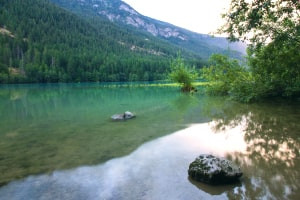This free online course in environmental philosophy will discuss human-Nature relationships; how environmental ethics is the part of environmental philosophy that considers extending the traditional boundaries of ethics from solely including humans to including the non-human world; and how traditional indigenous knowledge is important in understanding our natural surroundings and creating sustainable solutions for resource management. You will start by learning how environmental ethics emerged from the American wilderness movement in the 1960s, which helped create the great national parks in the United States. Ponder two classic polarities of environmental ethics: the opposition of preservationists to utilitarians; and anthropocentric to biocentric attitudes towards Nature. This will be your starting point for understanding the development of several environmental philosophies. The first you will learn about is ‘deep ecology’, developed by the Norwegian philosopher Arne Naess, which promotes the inherent worth of all living beings regardless of their instrumental utility to human needs, plus the restructuring of modern human societies in accordance with this idea. Naess claims that the essence of deep ecology is to ask deeper questions, probing the values of our societies, and to the development of a holistic point of view.
The second environmental philosophy you will analyze is ‘social ecology’, which argues that the environmental crisis is a result of the hierarchical organization of power and the authoritarian mentality rooted in the structures of human society. In social ecology, the elite class is viewed as manipulating the Earth’s natural resources ‘for their own benefit at a substantial cost to the environment and disadvantaged social groups’. In place of hierarchical and class systems, social ecology proposes an egalitarian society based on mutual aid, caring and communitarian values. People in this ‘new society’ would appreciate that the interests of the collective are inseparable from those of each individual. The third environmental philosophy you will study is ‘ecological feminist philosophy’ or ‘ecofeminism’. It is not one of the different perspectives of feminism, such as liberal, traditional Marxist, radical or socialist. It is, rather, a philosophical approach emphasizing the variety of different connections between feminism and the environment, between the domination of women (and other humans) and the domination of Nature. It is a recent development in feminist thought which argues that the current global environmental crisis is a predictable outcome of patriarchal culture.
Towards the end of this course, you will grapple with a growing trend in anthropological studies known as ‘ethnoecology’, which is the study of how different groups of people living in different locations understand the ecosystems around them and their relationships with their surrounding environments. The ‘traditional’ or ‘indigenous’ knowledge that native people have acquired through the centuries over generations of interactions with their natural surroundings, is valuable in understanding how these communities sustained these ecosystems for the survival of their own culture. Anthropologists believe that our current scientific knowledge needs to reconcile with this indigenous knowledge to create modern and sustainable solutions for managing our natural resources. You will also examine research by a group of scientists, headed by the noted ecologist Professor PS Ramakrishnan entitled, ‘One Sun, Two Worlds: An Ecological Journey’, styled in the form of a dialogue between two knowledge systems, 'traditional knowledge' and 'formal knowledge'. This free online course will deepen your understanding of ecological philosophy and the different approaches of various philosophies of ecology.
What You Will Learn In This Free Course
View All Learning Outcomes View Less All Alison courses are free to enrol, study, and complete. To successfully complete this Certificate course and become an Alison Graduate, you need to achieve 80% or higher in each course assessment.
Once you have completed this Certificate course, you have the option to acquire an official Certificate, which is a great way to share your achievement with the world.
Your Alison certificate is:
- Ideal for sharing with potential employers.
- Great for your CV, professional social media profiles, and job applications.
- An indication of your commitment to continuously learn, upskill, and achieve high results.
- An incentive for you to continue empowering yourself through lifelong learning.
Alison offers 2 types of Certificate for completed Certificate courses:
- Digital Certificate: a downloadable Certificate in PDF format immediately available to you when you complete your purchase.
- Physical Certificate: a physical version of your officially branded and security-marked Certificate
All Certificate are available to purchase through the Alison Shop. For more information on purchasing Alison Certificate, please visit our FAQs. If you decide not to purchase your Alison Certificate, you can still demonstrate your achievement by sharing your Learner Record or Learner Achievement Verification, both of which are accessible from your Account Settings.
















 Avg. Hours
Avg. Hours  Contains Video
Contains Video  CPD Accredited
CPD Accredited 
 Total XP:
Total XP: 
 Knowledge & Skills You Will Learn
Knowledge & Skills You Will Learn 


